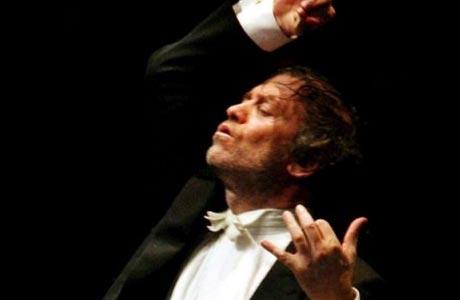Valery Gergiev’s survey of the Tchaikovsky symphonies began here on a chilly January night with youthfully idealistic Winter Daydreams thrown into the sharpest relief against a disillusioned and angry Shostakovich whose own journey into the bleak mid-winter was, by the time he penned his Second Violin Concerto, very much a one-way ticket. Two revealing performances, one remarkable young violinist.
Sergey Khachatryan is wise beyond his years, a slight, wiry, pent-up young man whose small, concentrated sound is so much the product of his inner voice that it feels almost intrusive listening. He began this, the second of Shostakovich’s concertos for David Oistrakh, like a cantor, spinning the Jewish inflections of the melody like a weary voice who has sung these same incantations far too many times and to too little avail. The comedic transformation of this material is cynical and irreverent with pointed references to The Execution of Stepan Razin (cue the hollow rattle of the tenor drum) and even the remorseless driving motif of the First Cello Concerto, whose recollection spawns the addition of another significant obbligato horn part (the athletic David Pyatt).
This was seat-of-your-pants stuff, the London Symphony Orchestra clinging doggedly to notes they had rarely played (and perhaps minimally rehearsed) but taking their energy from a solo performance of such fierce intensity and steely virtuosity that one could not for a second slip into passive listening. The still centre of the piece was quite extraordinary, ears drawn to the sound as moths to a single candle, the rapture rising with the ledger lines and the parched double-stopped cadenza already pointing to the super-hushed Bach of Khachatryan’s encore. The skittish finale was all exclamation and pointless figuration – a wild ride to nowhere; a composer worn out from protesting too much and for too long.
What relief, then, to daydream. Tchaikovsky’s First Symphony emerged from a rising haze of frosty air (oscillating violins) as the unlikely alliance of flute and bassoon sang their simple song. But it was the gorgeous second subject, subtly shaded in Andrew Marriner’s solo clarinet, that was so full of romantic promise, and when it returned later in the movement in concerted winds, Gergiev’s audible grunts of appreciation were for the radiant harmony so rapturously realised now in the rising first violin line.
Gergiev knows how this music goes – it’s as simple and as complicated as that – and this was one of those occasions where he was thoroughly engaged, the subtleties of phrasing and rubato communicated to his players through those fluttering hands and a mystical process of osmosis. The slow movement was a masterclass, the air humming with anticipation at the start, the humble theme spirited to its tremolando-festooned apotheosis with wonderful inevitability. And what about the series of silences marking out the transition from sombre to celebratory in the finale? Only the great ones can fill pause bars like this with such a sense of anticipation. Here’s to the rest of the journey.
- Check out what else is on at the Barbican this season
- Find Valery Gergiev on Amazon
- Find Sergey Khachatryan on Amazon













Add comment